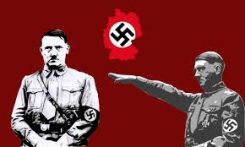Contents
Since our childhood, we shiver wherever we see his photo or hear his name. Even talking about him or thinking about his life story gives us fear. After all, it is not an easy task to deal with the life of a dictator whose past actions have written black letters in world history, namely Hitler. It is certain that if he had not made a few wrong decisions during Operation Barbarossa and the siege of Stalingrad while attacking the Russians on the Eastern Front and if Germany had won World War II, perhaps there would be statues of him in many parts of the world today and people would have grown up listening to his heroism.
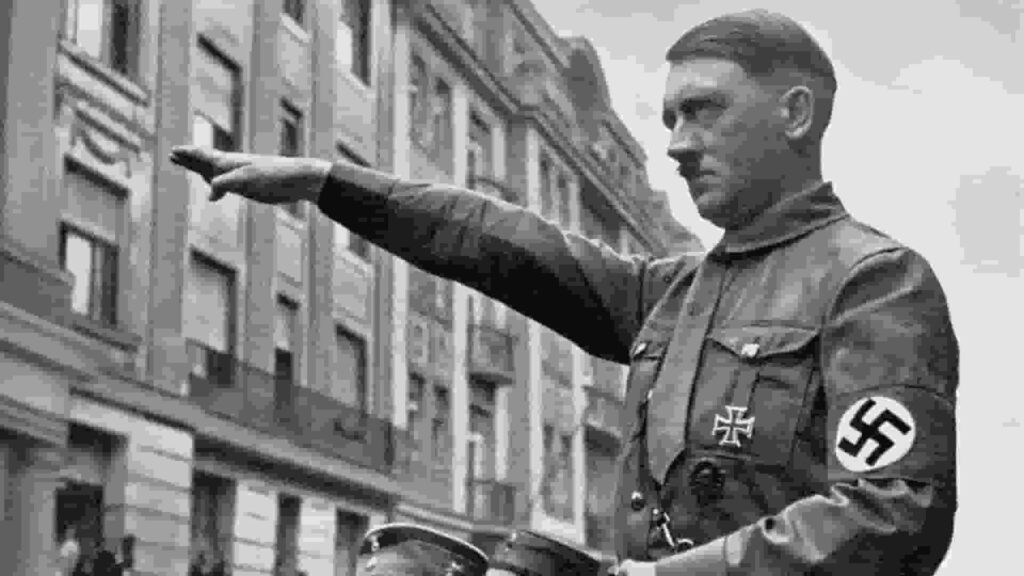
These are all assumptions, after all, history is written by the winners. Ultimately, the fact that he was a cruel and racist murderer is now globally well-accepted. So what happened that Adolf, who earned his living by painting for a while and was not very social, turned into a murderer who caused the deaths of millions of people. Or if he had received an acceptance from the Vienna Academy of Arts instead of a rejection, would history have gained a great painter?
In this article, instead of Adolf Hitler’s biography that you can find everywhere, we will try to briefly discuss his life story by doing a little brainstorming. After all, we all know that he caused the deaths of millions of people and started a world war and died by suicide when he realized that he would be defeated, right?
Early Life and Influences: The Formative Years of Hitler
Born in Austria on April 20, 1899, Adolf’s name means “lonely wolf” just like him. At the time he was born, the Austro-Hungarian Empire was a multinational structure and he was an Austrian citizen born in the German Region. In other words, he was a German racist who was not even a German citizen when he was born. It is a strange twist of fate that as his father, who was a customs officer, pressured him to become a public servant, he reiterated his desire and enthusiasm to become a painter. For this reason alone, the Fuhrer, who was physically abused by his father, also left school when he was 14 years old after his father died.
According to some, he was about to drown when he was only 4 years old and was saved by a priest. If this story is true, I wonder how that priest would feel if he remembered this situation years later? As we have said before, history is like an ocean with very different flows.
In this context, it should be noted that our aim here is to examine Hitler’s life as much as possible, to understand the historical flow that gave birth to him. Our aim is to do this as impartially as possible also. Little Adolf has now grown up and reached military age. At this very time, he does not want to serve in the Austrian army, then he tries to escape but fails. However, he is already deemed inadequate in the military examination and is not accepted into the army.
His dreams are shattered when he receives a rejection from the Vienna Art Academy, where he applied to become a painter at this age. He no longer knows what to do and leaves himself in the hands of fate.
His Young Germany Days
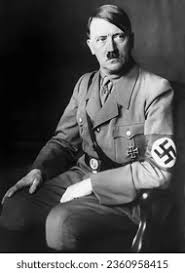
Under these circumstances, he goes to Munich with the small inheritance he inherited from his father. He has now lost his mother and is going through a very difficult financial period in Germany. Then, he later describe those years as the most difficult periods of his life.
He tries to make a living by selling the paintings he made with his own hands for a few pennies in pubs, on the streets and in cafes. At this very moment, Adolf, who was known as an introvert and quiet person, hears the news that will perhaps completely change the course of his life. When he hears that World War I has broken out in 1914, he immediately volunteers for the army. Hitler has grown up now.
World War I Days and Adolf’s Choices
When evaluating historical events, we should evaluate them the conditions of that period. From this perspective, the first global massacre, the world war, holds an important place in the life of Adolf Hitler. Because, the Fuhrer, who entered this war as an indistinct character, became an angry, overconfident and dominant character after the war. This is definitely due to the medals and achievements he received as well as the fact that he witnessed many painful events in the war. As well as his painting, his rank as a “corporal” in World War I is a little-known historical fact.
In fact, there are those who say that he did not receive more medals despite deserving them because he was not officially a German citizen. There are those who witnessed that he was very kind to prisoners before he was wounded in the war. On the other hand, witnessing the bloody battles with the British left deep marks on his character.
On the other hand, there are those who state that seeing the Jews continuing their daily lives in Munich, where he returned after being wounded in the war, caused him to feel hatred towards them. In addition, Germany found the Austro-Hungarian Empire and the Ottoman Empire on its side while fighting on many fronts in this war. On the other side, there was the group led by France, England and Russia. Hitler, whose character was shaped in such an environment, saw the most painful aspects of the war and examined England and Russia, whom he saw as Germany’s greatest rivals in the future, even in those days.
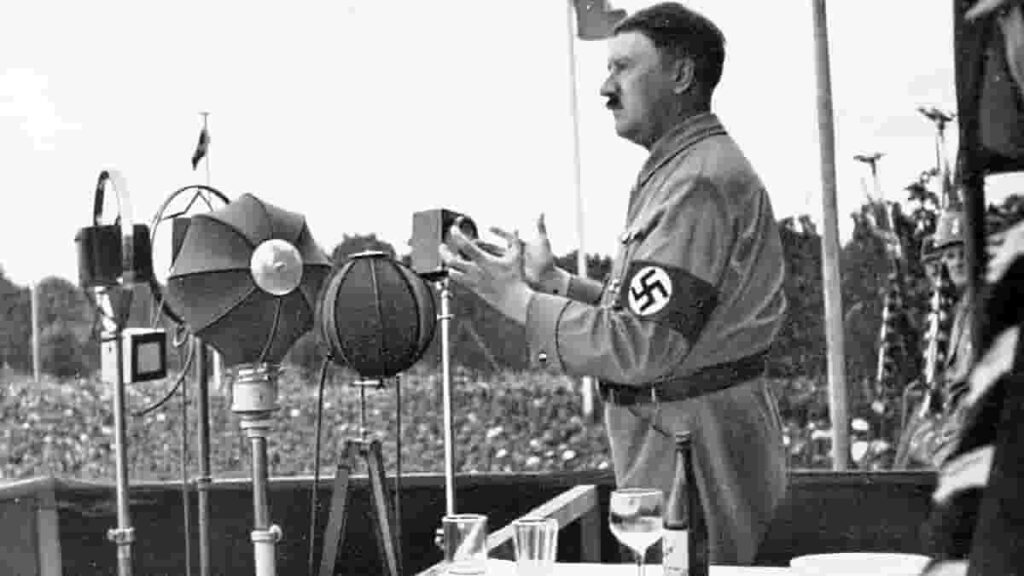
Hitler’s Role on War
Finally, to summarize his role and experience in the First World War briefly:
– He participated in the war with the rank of Corporal Infantry.
– Adolf was wounded in the Battle of the Somme in 1916 and this process deeply affected his psychology.
– He was described by his friends as a disciplined and hard-working soldier. He even told those who asked that the front was his home.
– Hitler received the first-degree Iron Cross medal, which is given only to officers, for his great courage and diligence.
– Towards the end of the war in 1918, he was poisoned by mustard gas during a British air raid and suffered temporary blindness.
The Treaty of Versailles
During his temporary blindness treatment in the hospital, Adolf Hitler received news that the Germans had surrendered and the war was over. According to him, this was a great betrayal. Indeed, according to some historians, the Germans were still standing strong as a fortress on the fronts. On the other hand, many generals had seen the course of the war and advised the Kaiser to surrender in order to prevent the country from being destroyed. Thus, the Kaiser abdicated and the Paris Peace Conference was convened. However, from the perspective of Hitler’s life, this surrender had such a deep effect that it caused him to have a nervous breakdown.
According to him, the Germans were sold out by Jewish generals and traitors. The basic feeling that would feed his national feelings and his sense of revenge for the rest of his life was the feeling that the motherland had been betrayed and humiliated. The effect of these feelings on the whole world would become much clearer in about 20-25 years. There are very subtle messages in diplomacy.
At this point, just as the Germans had the French sign the peace treaty at the Palace of Versailles after the 1871 war, when Bismarck and the Germans achieved German unity and seized French territory of Alsace-Lorraine, the French had the Germans sign this humiliating and very harsh treaty at Versailles after they were defeated in World War I. It is clear that the Germans did not want to sign this treaty, which was a treaty of surrender and destruction, from the end of the war on June 28, 1918 to July 28.
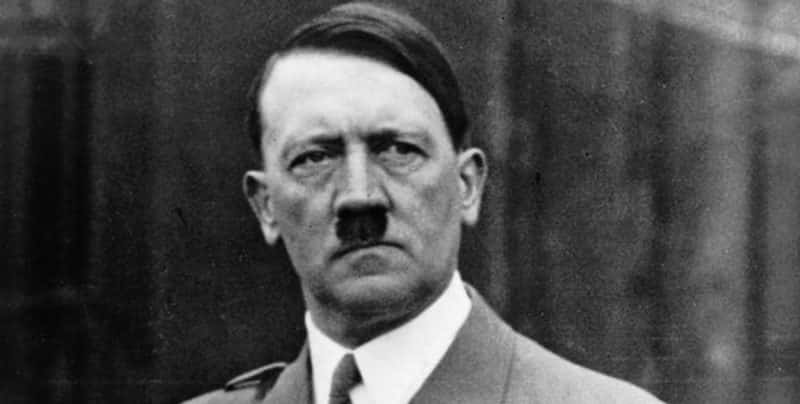
End of The War
During this process, the period known as the July crisis passed and when the Allied Powers stated that they would completely occupy Germany if all the articles were not fully accepted, the newly established government was forced to sign the Treaty of Versailles despite all public reaction. This treaty, which included humiliating clauses such as territorial losses, population losses, being declared war criminals, paying a war reparation of approximately 400 billion dollars in today’s money and never coming together with Austria again, perhaps led to the birth of Hitler and naturally World War II.
The war was over, Germany signed the Treaty of Versailles, took the name of the Bavarian Republic and accepted the rule of limiting its army to 100,000 soldiers. On the other hand, Adolf, who was a successful soldier, was assigned as an intelligence officer by the army. His duty was to monitor the extreme right-wing parties that were gaining strength in the post-war conditions. However, this duty led him to become a member of the German Socialist Workers Party. While attending their meetings as an agent, he found their views similar to his own and resigned from the army to join them.
Hitler’s Rise to Power: From Activist to Führe
On the other hand, between 1918 and 1928, this party could not exceed 3 percent and could not find a base among the people. During this period, Adolf Hitler changed the name of the party the German Socialist Workers Party and became its chairman. By the way, 1929 was a turning point for the whole world. The great economic depression that broke out in America hit the whole world. The USA withdrew its support from the Germans, to whom it had given credit and support at that time. Germany, which was already having difficulty paying war reparations, fell into great economic difficulties.
Adolf became a great hero with his marginal discourses and German racism for the Germans whose army was restricted and who lost their land and honour. In this climate, Adolf first established the militarist structure called the SS and then became the second largest party by receiving 38 percent of the votes in the elections. Hitler, who put pressure on the President in a short time and made himself Chancellor, or prime minister, shelved democracy after the controversial the Reichstag Fire, and transferred all the powers of the parliament to the cabinet.
In the meantime, he started to arrest the opposition with the SS militarist army he established. When President Paul von Hindenburg died in 1934, he immediately held a referendum and took his powers for himself with 89 percent of the yes votes, becoming the only man who was the Fuhrer. The Fuhrer, who opened many factories from this period until 1939 and reduced unemployment among the workers to almost zero, also prevented the workers from going on strike and received the full support of the capitalist class. So, it was not in vain that it received great support from society at that time.
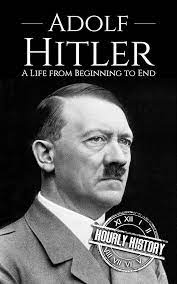
World War II: Holocaust, The Darkest Pages in History
Everyone knows that his aggressive actions were tolerated by England and France, who did not want a new war. In other words, everyone knew that the army had already exceeded the one hundred thousand, especially with the SS and later the SA forces, which included veterans. The eyes that wanted to see that the Germans, who had also established the arms industry, were preparing for a new and great war were seeing. British Prime Minister Chamberlain, who could not see this, was forced to resign. After all, Hitler first annexed Austria and then Czechoslovakia in 1938. Despite this, England and France did not fight him, on the contrary, they signed the Munich Agreement.
However, when the Fuhrer was arrested in 1923 for attempting to stage a coup against the current government, he explained one by one what he would do in the future in his work titled “Mein Kampf”. In his mind, he first attacked and eliminated England, then occupied Soviet Russia, which he called “living space” and was rich in food and natural resources. He also wanted to eliminate the Jews, whom he saw as the root of all evil, and gather the Germans, whom he saw as the superior race, under a single state.
After all these excesses, Adolf Hitler, who reached an agreement with the Soviets and captured western Poland in 1939, did not think that this relatively minor attack would cause a world war. Perhaps all of it had accumulated and the invasion of Poland was the last straw. After this invasion, England and France declared war on the Germans. Then, he attacked first England and then, when he failed, the Soviets in the east with Operation Barbarossa and drew them into the war.
The Fall of the Third Reich: Hitler’s Downfall
German tanks, which entered Stalingrad with lightning speed in the first days of the war, retreated due to the long duration of the war and the harsh winter conditions and began to suffer defeats one after another. This retreat would continue until Berlin and the Fuhrer, realizing that he would lose the war, kiilled himself and end his life.
Losing his father at the age of 14 and having to say goodbye to his dream of becoming an artist, the life of Adolf, an introverted and respectful child, led him to the way of German dictatorship.
Later, seeing his nation humiliated by the Treaty of Versailles, the Fuhrer saw the Jews as the cause of all evil and dragged the entire world into a war that would cause the deaths of approximately 80 million people. With the defeat by the Russians on the Eastern Front and the entry of America into the war, the Germans were now defeated and Berlin was being bombed.
Death of Hitler: Lessons from History: Reflections!
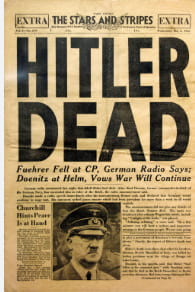
Hitler and the famous propaganda minister Goebbels experienced similar endings, in other words, they died by suicide. So, what were the conditions and reasons that brought him to power?
To list them briefly:
- Germans’ traditional search for raw materials and colonies due to the establishment of the German Union much later than other countries, and their conflicts with England and France,
- The fact that the First World War could not actually be ended with the Treaty of Versailles. In other words, the imposition of economic conditions that were too heavy for the Germans to bear,
- Again, the excessive crushing of German honour and pride with this treaty. On top of these feelings, Hitler’s statement that the Germans were the superior race found a great response from the German people, especially after the 1929 crisis.
- Germany’s economic and industrial development during Hitler’s era,
- Traditionally, Germans’ inclination towards the ideal of a great Germany
are listed.
Also, although it is not known for sure, the reasons why he hated the Jews throughout his life may be as follows:
- The possibility that he thought that Jewish privileged students were accepted to the Vienna Academy of Arts and that his rights were violated by them,
- The possibility that he believed that they surrendered due to the suggestions of Jewish generals, despite not being defeated in World War I,
- When he was injured during the war, he believed that the Jews were enjoying while the Germans were fighting,
- He saw them as responsible for Germany’s economic problems.
Of course, all of these are possibilities and history will give the real verdict.
